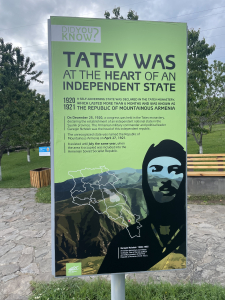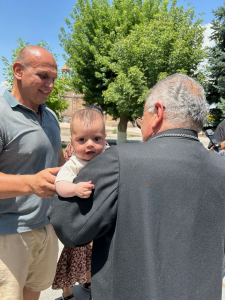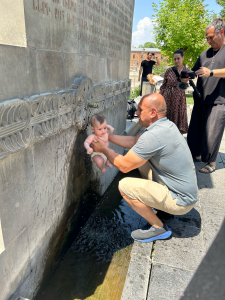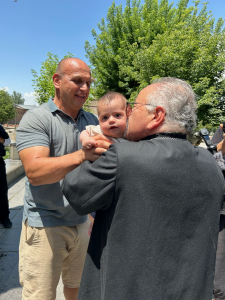Osheen Keshishian was honored on November 10, 2024 at the St. Leon Armenian Cathedral in Burbank, by Archbishop Hovnan Derderian, Primate of the Western Diocese. On this occasion His Eminence announced that Osheen Keshishian will have the distinction of being the first “Centennial Luminary” for his long-standing dedication and contributions to the Armenian Church and Armenian Nation. The Diocese will be celebrating its Centennial Anniversary in 2027 and on that occasion a special dedication and plaque will be installed in his honor.
Primate of the Western Diocese. On this occasion His Eminence announced that Osheen Keshishian will have the distinction of being the first “Centennial Luminary” for his long-standing dedication and contributions to the Armenian Church and Armenian Nation. The Diocese will be celebrating its Centennial Anniversary in 2027 and on that occasion a special dedication and plaque will be installed in his honor.
On this occasion, the Primate asked Fr. Vazken Movsesian to celebrate the Divine Liturgy and offer the day’s sermon, and present Osheen Keshishian to the community. His sermon appears below.
Angels, the Messengers – prelude to presenting Osheen Keshishian
Sermon Delivered by Fr. Vazken Movsesian (English Translation)
One of the great disservices we do to our Faith is when we overdramatize or fictionalize the characters of our faith to the point that they represent a fantasy. Accordingly, they lose meaning and relevance for us.
This weekend the Armenian Church celebrated the feast of the Archangels Gabriel & Michael. The word angel means messenger. Angels are the ones who reveal a message to us. Think of all the different ways we have overdramatized angels, from Old Testament imagery to Church iconography, to stained glass windows, all the way to the Hollywoodization of angels with wings, harps, bows and arrows, white robes, halos, to the point that they enter the category of fantasy, and their purpose and message is forgotten.
The night Jesus was born, the angels brought a message: Peace on Earth, goodwill toward one another. That’s it. It was that simple. It’s what the message of Christianity has always been. This past week we had presidential elections. Along with the elections a narrative was given about Christianity, which all but missed the point of peace on earth and goodwill toward one another. Think of the many articles of Faith that get overdramatized. For instance miracles. Hollywood would have us believe that miracles occur with thunder and lightning, and while we’re looking up to the heavens for these spectacular sights, we miss the true miracle of a smile in our child’s eye, or that paper-like fingernail on a newborn that cannot be duplicated by any machine or person. In other words, we lose sight of real miracles when we downgrade the word to fantasy.
In the Armenian Church and in all of Christianity – an angel is a messenger – often sent by God to reveal a truth to us. The angel was sent to Mary to let her know that she is with Child of the Holy Spirit. We have no details of what that angel wore, what he looked like, what color his garments or skin color were. Nor do we know anything about his moral character, because that is not the point of the story. The story is to convey to us that Mary had found favor with God and would bear the Christ Child.
When our attention is grabbed by outward expressions such as wings and halos, we lose sight of the message and even worse, we lose contact with something very special. God is always talking to us but our receptors are so dull that we don’t hear. God’s messages are all around us. Our children, our parents, the flower in your garden, the beautiful landscape across the hills are messages sent to us daily.
When we make the images and the articles of faith bigger than life we don’t have a chance to interact – to dialogue. The entire point of religion is to engage us, make life – our existence and our world – into a better place. And this is why we reject the idea of jakatagir – fatalism.
In an old Los Angeles neighborhood not far from us there stands the St. Sophia Greek Cathedral. Today the neighborhood is made up of many different ethnicities. Across from the cathedral there is a big sign atop another building: We are each of us angels with only one wing, and we can only fly by embracing one another. (Luciano De Crescenzo). It is a beautiful expression of messengers engaging in a dialogue. We can fly only if we connect with one another.
Today we gather to honor a messenger – one who has brought a message of hope through his positive outlook of the world, Osheen Keshishian. For over seven decades he has selflessly given himself to the Armenian community and to the Armenian Church. Born in Jerusalem, he moved to Beirut during the Palestinian war and came to the United States in 1956. Since his arrival to the United States he has been the second wing to countless people, and helped us fly.
He is loved and respected by all. Just like Cher and a few others, he is known by one name! When you say Osheen everyone knows who you are talking about.
Our history as Armenians in the diaspora goes back several centuries, but it was in the 20th century that here. in the Western Diocese – the West Coast of the United States – the population of Armenians increased. Every time Armenians were caught in persecution or were exiled from their homes, they came to America and the Western Diocese has turned become the last station stop for Armenians. Beginning with the massacres of the 1890s, you can follow the waves of migration to America. Of course, there was the Genocide with refugees coming in the 1920s, then World War II in the 1940s, the Civil War in Lebanon in the 1970s, the fall of the Shaw and the Revolution in Iran in 1979 into the 1980s, and the collapse of the Soviet Union in the 1990s.
The Armenian Church has been there at each step of the way. As a scholar of the Armenian world, particularly the Diaspora, Osheen Keshishian has documented and shaped that journey. In the Western Diocese he was the editor of the first Diocesan wide newspaper, the Californian. In 1970 Osheen Keshishian established and published the Armenian Observer newspaper. For over 50 years he has chronicled and documented the story of the Armenian Diaspora on the pages of his newspaper.
Long before the Internet or such functions as Google to answer your question, Osheen Keshishian was the source for all things Armenian. He is a walking encyclopedia of knowledge about all things Armenian. He is a messenger and an educator. In 1985 he began teaching at Glendale Community College, and formally received the title of Professor. He has been respected on the world stage, giving lectures and participating in the conferences and yet, he always has time and makes time to discuss and share his wisdom with everyone. Particularly the young, always concerned with the welfare and development of the Armenian Community.
In 1965, on the 50th anniversary of the Armenian Genocide a group of men began work on the Armenian Martyrs’ Monument in Montebello and saw its completion and dedication in 1968 with the blessing of Catholicos Vazken I, of blessed memory. Osheen Keshishian was one of the members of the group that brought the Monument to fruition.
He has met world leaders, with three sitting Presidents and engaged in conversation with President Ronald Reagan about the Armenian Genocide. He has interviewed every Armenian-world personality over the last seven decades, from Church “giants” such as Vazken I, Patriarch Shnork, Patriarch Yeghishe, Patriarch Torkom, Catholicos Karekin I and Karekin II, to Philanthropists the likes Kirk Krekorian and Alex Manoogian and Armenian celebrities such as Charles Aznavour, Roupen Mamoulian, and Mike Conners.
One of the most memorable events in his life came out of his friendship with Pulitzer Prize Winner William Saroyan. In 1982 a small group was formed in Fresno to take Saroyan’s ashes to Armenia for burial there. Osheen Keshishian was asked by the Armenian government – Diasporan relations – to be a part of this group. With great honor he became part of the entourage and personally delivered the remains to Armenia, but first greeted in Moscow, and then Armenia for a ceremony witnessed by over 50,000 people.
Let us not forget that all of this happened at the height of the Cold War. He has the gift of engaging everyone in conversation. He weaves a rich story of personal anecdotes and wisdom in his talks and conversations. For this reason, The Armenian Observer has been respected as a reliable source of information, bringing home the message. His editorials were timely, critiquing Armenian life, placing his finger on the challenges that face us, and then offering solutions, giving answers that were laced with hope for the reader and for the Armenian World.
In the 1960s, when I was in elementary school in Hollywood, there were a handful of Armenians in the public school. By the time I got Marshall High School in Los Feliz, the number of Armenians was up, but not many. Osheen was a resource of Armenian knowledge for us. I had the good fortune of working with Osheen at the Armenian Observer while I went to college. I’d like to thank our Primate Archbishop Hovnan for giving me this opportunity to present Osheen Keshishian to the congregation. Today I have an opportunity to express my thanks and appreciation to a man who taught us so much, who became the second wing to push us to new heights. It was people like Osheen that kept the Armenian spirit alive. His activism in our community will always be honored.








 Primate of the Western Diocese. On this occasion His Eminence announced that Osheen Keshishian will have the distinction of being the first “Centennial Luminary” for his long-standing dedication and contributions to the Armenian Church and Armenian Nation. The Diocese will be celebrating its Centennial Anniversary in 2027 and on that occasion a special dedication and plaque will be installed in his honor.
Primate of the Western Diocese. On this occasion His Eminence announced that Osheen Keshishian will have the distinction of being the first “Centennial Luminary” for his long-standing dedication and contributions to the Armenian Church and Armenian Nation. The Diocese will be celebrating its Centennial Anniversary in 2027 and on that occasion a special dedication and plaque will be installed in his honor.











